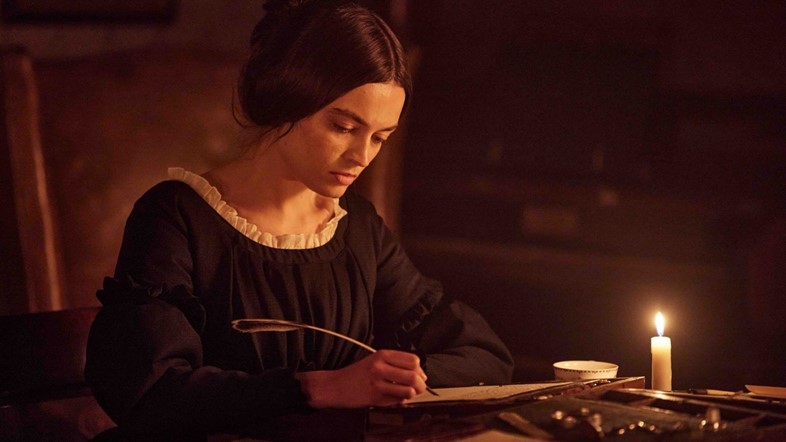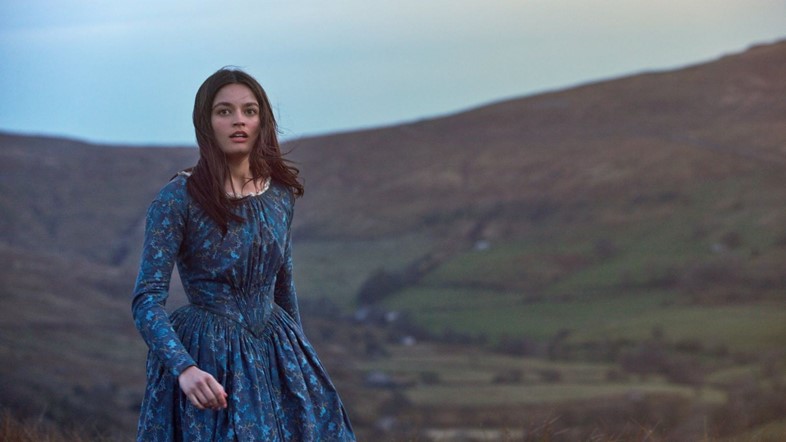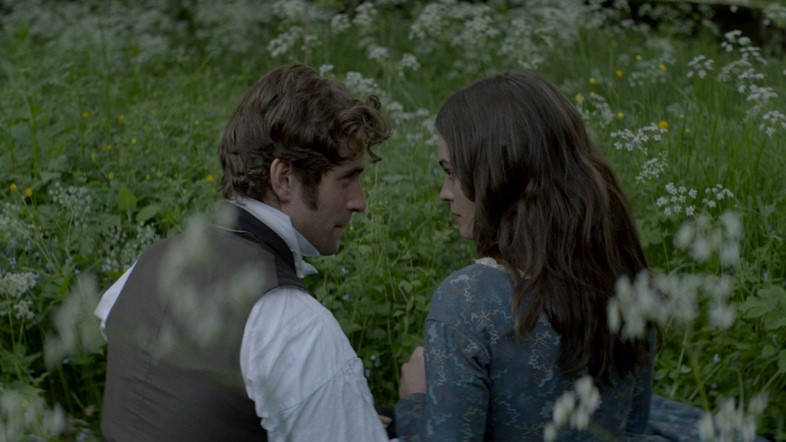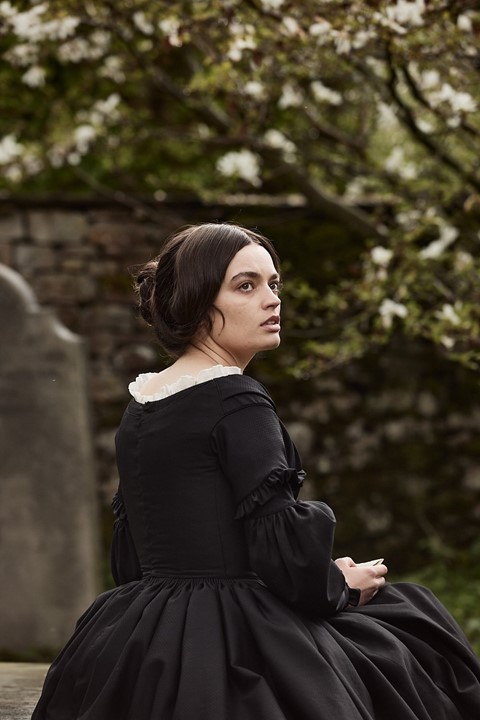As Frances O’Connor’s new film Emily is released, the Sex Education star discusses the “thrilling” process of playing the Wuthering Heights author – and how she feels about being compared to Margot Robbie
From Sex Education to period transformation, Emma Mackey’s filmography is showcasing her versatility. To most people, the 26-year-old French-British actor is Maeve, the stand-out character of Netflix’s sitcom Sex Education. From 2019 until early 2022, Mackey didn’t have much else to her name – other than a TV film and a viral clip about being mistaken for Margot Robbie. This year, though, Mackey metaphorically kills in Death on the Nile, she climbs dramatic heights in Eiffel, and she embodies Emily Brontë in Frances O’Connor’s revisionist period-drama Emily.
Whereas an actor from The Inbetweeners couldn’t be cast in anything serious nowadays, Mackey excels in Emily, a weighty, intense, 1840s-set movie about the famously lonely author of Wuthering Heights. Except in O’Connor’s screenplay, Emily Brontë gets her own sex education from William Weightman (Oliver Jackson-Cohen), a clergyman and French tutor who puts extra care into the oral examinations. Historical documents may suggest Emily died at 30 without romance, but Emily posits that the second-youngest Brontë sibling was getting laid – and with a hymn-singing himbo.

Although Mackey grew up in France, she studied English at Leeds University and was already familiar with Wuthering Heights and Charlotte Brontë’s Jane Eyre when the script came her way. “It’s not a biopic and it shouldn’t be sold that way,” the actor tells me in Rosewood Hotel, in early October. “It’s a retelling. It’s Frances’s interpretation, and she’s deeply passionate about Emily Brontë and Wuthering Heights. It’s done with a lot of bravery and sensitivity … It’s an interweaving of the images from that novel into her life.”
Mackey is, it seems, an honest interviewee. She resists the urge to fabricate a story about a long, deep connection with Wuthering Heights – it’s just a book she enjoyed. Likewise, when I mention that Ana de Armas claimed to receive the blessing of Marilyn Monroe for Blonde, Mackey responds, “I’m not spiritual.” Instead, Mackey is more passionate about the filmmaking process behind Emily, which was shot with handheld cameras, natural lighting, and timely rain on location in Haworth. “It was evocative visiting the parsonage, and seeing that Emily’s bedroom looked out onto a graveyard,” she says. “Her whole life, she woke up to graves.”
An early highlight is when Emily puts on a mask and convinces a crowded kitchen that she’s possessed by her dead mother. For a moment, you’re watching The Exorcist. “Suddenly you’re not in a costume-drama. You’re like, ‘What the fuck?’ I love that undertone of the supernatural that they were so fascinated with at the time. That gothic element carries its weight in the film.”

Little is known about Emily Brontë’s real life. Charlotte Brontë, her older sister, provided a few biographical nuggets, while books have generally depicted a loner who wandered the windy moors for hours, like a Cathy without a Heathcliff. The romantic (or unromantic) notion was that Wuthering Heights was the product of a defiantly antisocial woman who locked herself away and created a masterpiece of literature. Is it really that radical, then, for Mackey’s Emily to be creatively awakened by heterosexual intercourse with a conventionally handsome Hollywood hunk?
“I understand that people are bothered by (the romance),” Mackey says. “But it doesn’t matter! It’s an interpretation, not a documentary. It’s Frances’s vision. She wanted to show a young woman trying to find her authentic voice, but knowing she always had it. There’s also a dreamscape in the film. You never know what genre you’re really in. It’s supernatural, or there’s the very real, gritty Yorkshire weather that I’m running up and down hills in.
“When Emily is writing Wuthering Heights, and it’s just a pen and paper – it’s just Emily Brontë. It doesn’t matter if she experienced this stuff or not. It’s up to you to decide. It’s not prescriptive. People keep trying to tell us there are rules. But they’re making films and telling stories. It’s bullshit. Just experience the film. Like it, or don’t.”

The shoot itself lasted six weeks, with Mackey performing in practically every scene, often for long takes. “I stopped working for a while after it because it just cost a lot for me to make it.” She then clarifies, “Not money-wise. It just cost a lot of me. I cared a lot about it. It took a lot out of me. But it was thrilling. There were so many different interpretations and versions of scenes.”
After Emily (and the break after Emily), Mackey shot a supporting role in Greta Gerwig’s Barbie and started work on season four of Sex Education. Curiously, in the pilot of Sex Education, Maeve’s boyfriend, Jackson, is referred to as a “Ken doll”; in Laurie Nunn’s script, Maeve is introduced as “sex on legs and hard as nails”. To what extent is Maeve – a schoolgirl unhappy with the constant objectification by her peers – a subversion of Barbie?
“I don’t even know how to answer that question!” Mackey responds. “Maeve doesn’t like to be objectified, for sure.” Instead, Mackey goes onto praise Barbie and, in particular, Gerwig, who she calls a hero. “It was one of the highlights of my entire life to see Greta handle something like Barbie, which is a toy, and to see her brain handle that story. I’m really fascinated to see what it looks like.”
In Barbie, Mackey will be sharing the screen with Margot Robbie, which will no doubt increase chatter about their physical similarities – Robbie has also noted that confused strangers will sometimes compliment her on Sex Education. However, Mackey has expressed a dislike of people bringing up the comparison, so I ask – while, admittedly, indirectly discussing the topic – if there’s sexism involved, or perhaps allusions to disposability?
“I don’t think it’s that deep,” Mackey says. “But it’d be great if people would stop focusing on the element of how we look, and more on what we do, specifically in Margot’s case, who’s an Oscar-nominated actor and producer.” Maybe, after Emily, strangers on the street will mistake her for Emily Brontë? “Yeah! Who knows?”
As Mackey has been so defensive about O’Connor’s revisionist approach, I decide to spin it around: what if, 200 years from now, someone made a film called Emma Mackey that fictionalised the actor’s private life? “And it invented my life?!” she exclaims. “It’s obviously a strange concept but Emily Brontë didn’t get a good review until 50 years after she died. She wrote one novel and wrote poems. A lot of her work has been lost. She’s a mysterious person but she also never got celebrated in the way she is now. Film is such a powerful tool for that, and it reaches people in a way that is impactful. It feels like a real celebration of her inner life and imagination.”
Emily is in cinemas from October 14.
